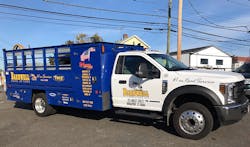Eight months ago, Barnwell House of Tires found itself at the epicenter of the COVID-19 pandemic in New York City, supplying tires and related services that enabled waste haul, utility and other essential fleets to operate, while enacting measures to protect the well-being of its customers and employees. “The Big Apple” is no longer the nexus of the pandemic and Barnwell has emerged as a stronger, more nimble company. Scott Weeden, the dealership’s vice president of sales, calls it “the corona shift.”
“We were already in cost saving mode coming into 2020,” he recently told MTD. “So we were in that mind-set. When the pandemic hit, we got together and put together a plan that would enable us to continue to operate and satisfy customers," while simultaneously guarding the safety of employees.
The Ronkonkoma, N.Y.-based dealership - which also operates in New Jersey, eastern Pennsylvania and adjacent areas - immediately went paperless and no longer required customers to provide physical signatures upon the delivery of products and services, such as emergency roadside assistance.
“If one employee got COVID-19 and it trickled down, it would have destroyed anything we were trying to build,” said Weeden, who noted that the elimination of physical signatures was so well-received by customers that Barnwell decided to keep the practice, in addition to maintaining other safety systems.
“We haven’t had anyone come down with COVID-19. And we want to keep that going.”
Weeden said the pandemic gave Barnwell an opportunity to “drill down” into customers’ operations and business needs.
“We sat down with our key customers” after COVID-19 hit. “We went over the tires they were running, how they were performing, if there were better tires for them and if we could get those tires. We looked at all of our existing customers and where we could fit in and help them.”
While demand from certain customers, like waste haul fleets, has fluctuated, “we haven't seen a drag in our OTR tire business at all. In fact, we’ve seen a big influx.”
Demand for retreads has remained steady, as well.
The dealership also continues to place tires in fleet trials. “Right now, we have a pilot program with a major fleet in New York” that could generate $200,000 in savings for the trucking operation over the next year-and-a-half, according to Weeden. (“It’s all about putting the right tire in the right application.”)
Internally, Barnwell has maintained an intense focus on orders, inventories, receivables and cash flow. The net result is that the dealership is “much stronger than we were” during the early days of the pandemic. Revenue is up “and our gross profit has gone up,” Weeden told MTD.
“That has put us in a position to invest in new equipment. We have three OTR boom trucks on order. We have additional road service trucks on order. And we’re gearing up to service Ryder,” the truck leasing giant that one of Barnwell’s tire suppliers signed earlier this year. “We’re going to be handling all of that business in New Jersey and New York, which will result in significant growth.”
Why was Barnwell able to pivot so successfully during the pandemic? “It was something we were committed to,” said Weeden. “And we are committed to our customers’ business models - whether it’s OTR tires, truck tires, retreading or road service. That’s put us in the position where we are now.”
About the Author
Mike Manges
Editor
Mike Manges is Modern Tire Dealer’s editor. A 28-year tire industry veteran, he is a three-time International Automotive Media Association Award winner, holds a Gold Award from the Association of Automotive Publication Editors and was named a finalist for the prestigious Jesse H. Neal Award, the Pulitzer Prize of business-to-business media, in 2024. He also was named Endeavor Business Media's Editor of the Year in 2024. Mike has traveled the world in pursuit of stories that will help independent tire dealers move their businesses forward. Before rejoining MTD in 2019, he held corporate communications positions at two Fortune 500 companies and served as MTD’s senior editor from 2000 to 2010.

